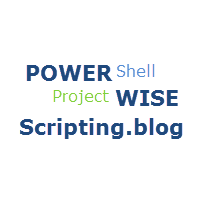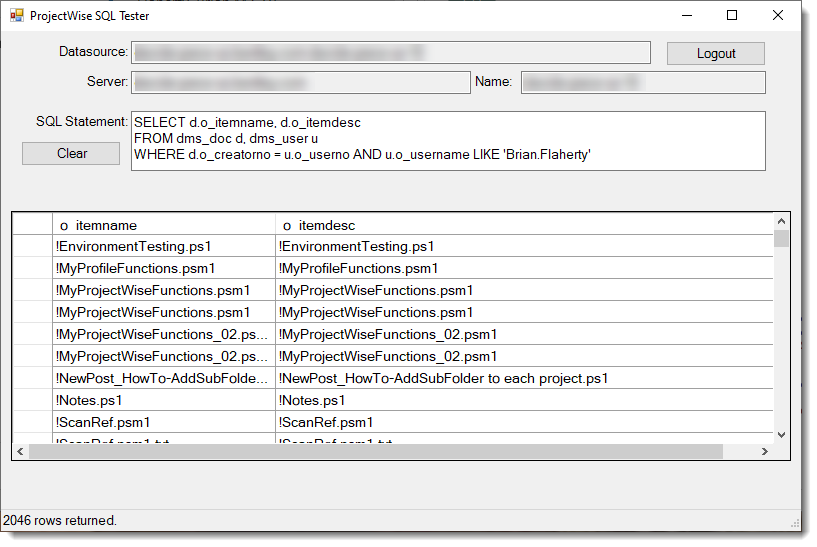Be sure to check out my Scripting4Crypto initiative. It’s a fun way to get into using cryptocurrencies all while getting your PowerShell needs met.
In this post I will show you how to create a GUI for testing Select SQL statements. I have used this for developing / testing Select SQL statements to be used within Environment Attributes when I don’t have SQL Management Studio available. Comes in handy.
All of the ProjectWise related cmdlets are available using the PWPS_DAB module. At the time of this post, I am using version 1.29.4.0. Take a look at the help for each of the cmdlets to become familiar with their functionality, available parameters, etc.
- New-PWLogin
- Undo-PWLogin
- Get-PWCurrentDatasource
- Select-PWSQL
Define GUI
The first thing I want to do is specify how the GUI will look and which controls will be included. I will be including a method to log in and out of a ProjectWise datasource. There will a text box for entering the SQL Select statement to test and a datagridview to display the returned data.
Default Values
The default values are standard control values such as the size of a control or alignment of the text. These will be used to define the controls.
#region GUI DEFINITION
#region DEFAULT VALUES
[Windows.Forms.Application]::EnableVisualStyles()
[int] $frmSizeHeight = 500
[int] $frmSizeWidth = 800
$Font = 'Microsoft Sans Serif,10'
$lblAlign = 'MiddleRight'
$lblSize = '120, 20'
$txtAlign = 'Left'
$txtSize = '360, 20'
$btnSize = '25, 22'
$pbSize = "$($frmSizeWidth), 20"
$txtWidthDerived = $($frmSizeWidth - 120) / 2
#endregion DEFAULT VALUES
Create FORM
Here we will create the form definition.
#region FORM
$frmUserInfo = New-Object -TypeName System.Windows.Forms.Form
$frmUserInfo.ClientSize = New-Object -TypeName System.Drawing.Size( $frmSizeWidth, $frmSizeHeight)
$frmUserInfo.Text = 'ProjectWise SQL Tester'
$frmUserInfo.TopMost = $true
$frmUserInfo.TopLevel = $true
$frmUserInfo.MinimumSize = New-Object -TypeName System.Drawing.Size( $($frmSizeWidth/2), $($frmSizeHeight/2))
$frmUserInfo.StartPosition = 'CenterScreen'
$frmUserInfo.Font = $Font
#endregion FORM
Create Datasource Controls
Here we will define all of the controls related to the ProjectWise Datasource.
#region DATASOURCE
#region DATASOURCE (Server/Name)
# Control Y location Value
$Datasource_Y = 10
$lblDatasource = New-Object -TypeName System.Windows.Forms.Label
$lblDatasource.Location = New-Object -TypeName System.Drawing.Point -ArgumentList (10,$Datasource_Y)
$lblDatasource.Text = 'Datasource:'
$lblDatasource.AutoSize = $false
$lblDatasource.Size = $lblSize
$lblDatasource.TextAlign = $lblAlign
$txtDatasource = New-Object -TypeName System.Windows.Forms.TextBox
$txtDatasource.Location = New-Object -TypeName System.Drawing.Point -ArgumentList (130,$Datasource_Y)
$txtDatasource.Multiline = $false
$txtDatasource.Width = $($frmSizeWidth - $lblDatasource.Width - 160)
$txtDatasource.Size = ("$($txtDatasource.Width), 20")
$txtDatasource.ReadOnly = $true
$txtDatasource.Anchor = 'top,right,left'
$btnDatasource = New-Object -TypeName System.Windows.Forms.Button
$btnDatasource.Location = New-Object -TypeName System.Drawing.Point -ArgumentList ($($frmSizeWidth - 135),$Datasource_Y)
$btnDatasource.Text = 'Login'
$btnDatasource.Size = '100, 25'
$btnDatasource.Anchor = 'top,right'
#endregion DATASOURCE (Server/Name)
#region DATASOURCE SERVER
# Control Y location Value
$Datasource_Y = 40
$lblDSServer = New-Object -TypeName System.Windows.Forms.Label
$lblDSServer.Location = New-Object -TypeName System.Drawing.Point -ArgumentList (10,$Datasource_Y)
$lblDSServer.Text = 'Server:'
$lblDSServer.AutoSize = $false
$lblDSServer.Size = $lblSize
$lblDSServer.TextAlign = $lblAlign
$txtDSServer = New-Object -TypeName System.Windows.Forms.TextBox
$txtDSServer.Location = New-Object -TypeName System.Drawing.Point -ArgumentList (130,$Datasource_Y)
$txtDSServer.Multiline = $false
$txtDSServer.Width = $txtWidthDerived
$txtDSServer.ReadOnly = $true
$txtDSServer.Anchor = 'top,left'
#endregion DATASOURCE SERVER
#region DATASOURCE NAME
# Control Y location Value
$Datasource_Y = 40
$lblDSName = New-Object -TypeName System.Windows.Forms.Label
$lblDSName.Location = New-Object -TypeName System.Drawing.Point -ArgumentList ($($txtDSServer.Right),$Datasource_Y)
$lblDSName.Text = 'Name:'
$lblDSName.AutoSize = $true
$lblDSName.TextAlign = $lblAlign
$txtDSName = New-Object -TypeName System.Windows.Forms.TextBox
$txtDSName.Location = New-Object -TypeName System.Drawing.Point -ArgumentList ($($($lblDSName.Left) + 50),$Datasource_Y)
$txtDSName.Multiline = $false
$txtDSName.Width = $txtWidthDerived - 95
$txtDSName.ReadOnly = $true
$txtDSName.Anchor = 'top,right,left'
#endregion DATASOURCE NAME
#endregion DATASOURCE
Create SQL Controls
Now we create the SQL related controls.
#region SQL
$lblSQL = New-Object -TypeName System.Windows.Forms.Label
$lblSQL.Location = New-Object -TypeName System.Drawing.Point -ArgumentList (10, 80)
$lblSQL.Text = 'SQL Statement:'
$lblSQL.AutoSize = $false
$lblSQL.Size = $lblSize
$lblSQL.TextAlign = $lblAlign
$txtSQL = New-Object -TypeName System.Windows.Forms.TextBox
$txtSQL.Location = New-Object -TypeName System.Drawing.Point -ArgumentList ('130', '80')
$txtSQL.Multiline = $true
$txtSQL.Width = $($frmSizeWidth - 165)
$txtSQL.Height = '60'
$txtSQL.ReadOnly = $true
$txtSQL.Anchor = 'top,left,right'
$btnSQL = New-Object -TypeName System.Windows.Forms.Button
$btnSQL.Location = New-Object -TypeName System.Drawing.Point -ArgumentList ($($lblSQL.Location.X + 10), $($lblSQL.Location.X + 100))
$btnSQL.Text = 'RUN'
$btnSQL.Size = '100, 25'
$btnSQL.Anchor = 'top,left'
$btnSQL.Enabled = $false
$dgvSQL = New-Object -TypeName System.Windows.Forms.DataGridView
$dgvSQL.Location = New-Object -TypeName System.Drawing.Point -ArgumentList (10, 180)
$dgvSQL.Text = 'Type;Value'
$dgvSQL.Width = $($frmSizeWidth - 20)
$dgvSQL.Height = 250
$dgvSQL.AllowUserToAddRows = $false
$dgvSQL.AllowUserToDeleteRows = $false
$dgvSQL.Font = $Font
$dgvSQL.Anchor = 'top,left,right,bottom'
#endregion SQL
Create Status Bar Control
Add a status bar for messages pertaining to the process.
#region STATUS BAR
$StatusBar1 = New-Object -TypeName System.Windows.Forms.StatusBar
$StatusBar1.location = New-Object -TypeName System.Drawing.Point -ArgumentList (0,($frmUserInfo.ClientSize.Height - $StatusBar1.Size.Height))
$StatusBar1.Size = $pbSize
$StatusBar1.Anchor = 'right,bottom,left'
$StatusBar1.Text = 'Status'
$StatusBar1.Font = $Font
#endregion STATUS BAR
Add Controls to the FORM
Finally, we add all of the controls to the form. If you do not add the controls here, they will not show in the form when it is displayed.
#region FORMS CONTROLS
$frmUserInfo.controls.AddRange(@(
$lblDatasource, $txtDatasource, $btnDatasource,
$lblDSServer, $txtDSServer,
$lblDSName, $txtDSName,
$lblSQL, $txtSQL, $btnSQL, $dgvSQL,
$StatusBar1
))
#endregion FORMS CONTROLS
Define GUI Events
The GUI Events tell the form what to do when a user interacts with the controls. For example, when a button is clicked or text is a field is changed.
Form Activated and Load Events
We didn’t specify anything to do for these two events.
$frmUserInfo.Add_Activated({ }) # end $frmUserInfo.Add_Activated...
$frmUserInfo.Add_Load({ }) # end $frmUserInfo.Add_Load...
Datasource Controls Events
These events deal with the datasource controls.
#region DATASOURCE EVENTS
$btnDatasource.Add_Click({
if($btnDatasource.Text -eq 'Logout'){
Undo-PWLogin
$StatusBar1.Text = "Successfully logged out of ProjectWise datasource '$($txtDatasource.Text)'."
$btnDatasource.Text = 'Login'
$txtDatasource.ResetText()
$txtSQL.ResetText()
$dgvSQL.DataSource = [string]::Empty
} else {
if(New-PWLogin){
$txtDatasource.Text = Get-PWCurrentDatasource
$StatusBar1.Text = "Successfully logged into ProjectWise datasource '$($txtDatasource.Text)'."
$btnDatasource.Text = 'Logout'
} else {
$StatusBar1.Text = 'Failed to log into ProjectWise datasource.'
}
}
}) # end $btnDatasource.Add_Click...
$txtDatasource.Add_TextChanged({
[string[]]$pwDS = (Get-PWCurrentDatasource).Split(':')
$txtDSServer.Text = $pwDS[0]
$txtDSName.Text = $pwDS[1]
if($txtDatasource.Text.Length -gt 0){
$txtSQL.ReadOnly = $false
} else {
$txtSQL.ReadOnly = $true
}
}) # end $txtDatasource.Add_TextChanged...
#endregion DATASOURCE EVENTS
SQL Query Controls Events
These events deal with the SQL Query controls.
#region Run Query
$txtSQL.Add_TextChanged({
if($txtSQL.Text.Length -gt 0 -and $txtSQL.Text.ToLower().StartsWith('select')){
$btnSQL.Enabled = $true
} else {
$btnSQL.Enabled = $false
$StatusBar1.Text = "SQL Statement MUST start with SELECT."
}
})
$btnSQL.Add_Click({
if($btnSQL.Text -eq "Clear"){
$StatusBar1.Text = "Cleared datagridview."
$dgvSQL.DataSource = [string]::Empty
$btnSQL.Text = "Run"
} else {
$SQLStatement = $txtSQL.Text
if($SQLStatement.ToLower().StartsWith('select')){
$StatusBar1.Text = "'$SQLStatement' is a valid Select statement."
$SQLResults = Select-PWSQL -SQLSelectStatement $SQLStatement
if($SQLResults.Rows.Count -gt 0){
$StatusBar1.Text = "$($SQLResults.Rows.Count) rows returned."
# Populate datagridview.
$dgvSQL.DataSource = $SQLResults
$btnSQL.Text = "Clear"
} else {
$StatusBar1.Text = "No data returned."
}
} else {
$StatusBar1.Text = "Invalid Select statement."
}
}
}) # end $btnSQL.Add_Click({...
#endregion Run Query
ProjectWise Login
The following deals with the logging in and out of a ProjectWise datasource.
#region PROJECTWISE LOGIN
if(Get-PWCurrentDatasource) {
$txtDatasource.Text = Get-PWCurrentDatasource
$StatusBar1.Text = "Currently logged into ProjectWise datasource '$($txtDatasource.Text)'."
$btnDatasource.Text = 'Logout'
}
#endregion PROJECTWISE LOGIN
Show Dialog
The .ShowDialog() method will display the form for use.
[void]$frmUserInfo.ShowDialog()
Using the SQL Tester
Log Into ProjectWise Datasource
That we have the form defined, we can run it. The first thing we need to do is log into a ProjectWise datasource. Click on the Login button. You will be prompted with the standard ProjectWise log in dialog.

Running a Simple Query
Once we are logged in, the SQL Statement textbox will enable and we can enter a query to run. The query MUST begin with the word Select. No space before Select. The RUN button will not enable until a valid select statement is entered.

The following is a simple query. And a sample of the data returned.

Click the Clear button to reset the datagridview.
Running a More Difficult Query
Here is a slightly more complicated query just to demonstrate a little more functionality. This should handle most SQL select statements. I cannot guarantee it will handle all.
Log Out of ProjectWise Datasource
Again you can use the Clear button to reset the datagridview.
Be sure to log out of your ProjectWise datasource prior to closing the form. You do this by clicking on the Logout button. When you log out of your datasource, all of the controls within the form should be reset.
Summary
Here we created a simple tool to develop and test SQL queries and demonstrated its use. This tool has come in handy for me and I hope you find it useful as well.
Experiment with it and have fun.
Hopefully, you find this useful. Please let me know if you have any questions or comments. If you like this post, please click the Like button at the bottom of the page.



This was Awesome, Thanks
LikeLike
Thanks for this very useful.
One thing I think would be even more beneficial would be to be able to point this at a document and see what the output from a statement would be.
i.e I would like to select a document and then test a statement like the one below and see what the output would be. Currently I have to keep refreshing administrator and going backwards and forwards until I get the statement correct! Think it would also be a useful tool to help learn the SQL side of things as you could quickly see what affect changes have!
SELECT DATEADD(day,-1 * (($EDIT#PW_WPP_CLIENT$ + $EDIT#PW_WPP_NWR$) + ($EDIT#PW_WPP_PREP$ + $EDIT#PW_WPP_CEM$) + ($EDIT#PW_WPP_ADVANCE$)) ,’$EDIT#PW_START_2$’);
Is this something that could be achieved? Any pointers how someone would go about that?
LikeLike